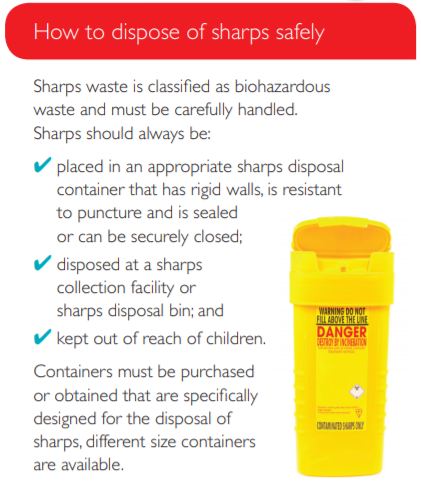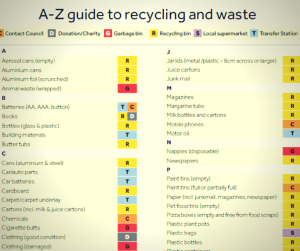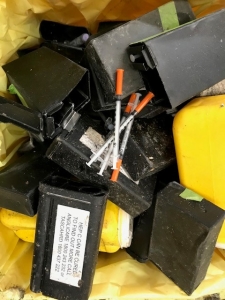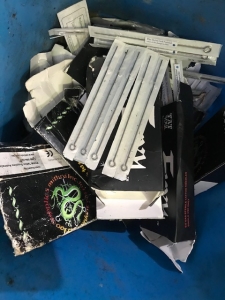Dangerous goods in kerbside recycling bins
Dangerous goods in kerbside recycling bins pose a real risk to staff at Tasmania’s Materials Recovery Facilities who are sorting bin contents by hand.
Examples of dangerous goods include needles and other sharps, ammunition and pieces of wire.
Help keep recycling sorting staff safe by keeping needles and other sharps out of kerbside recycling. If a needle is found in a load of recycling, sorting stops and it’s all diverted to landfill so workers remain safe.
The best way to dispose of syringes, needles and other sharps including those use in tattooing, is to place them in a specially designed sharps disposal container.
These approved biohazard containers have rigid walls, are resistant to puncture and can be sealed in such a way that the contents are not capable of causing injury.
Containers are available from the Tasmanian Government’s Needle and Syringe Program outlets. The outlets distribute sharps disposal containers and provide services for the appropriate disposal of used injecting equipment and full containers. Containers may also be available from your local council.
Find your nearest location from the Tasmanian Department of Health and Human Services’ Needle and Syringe Program website or contact your local council for advice.
What waste should go where?
 If you’re confused about what to do with specific items of waste, or you just want to check that you’re being a good sort, then our simple A-Z Guides to waste and recycling are for you!
If you’re confused about what to do with specific items of waste, or you just want to check that you’re being a good sort, then our simple A-Z Guides to waste and recycling are for you!
This one shows common waste items and how they can be best handled in North and North West Tasmania, whether in kerbside recycling, as garbage, at special collection points or as second hand goods:
This one delves into the southern region’s recycling bins and lists all those items that can be put into your kerbside recycling bin:
When we each do our bit to reduce, reuse and recycle it’s good for all Tasmanians!
Kerbside Recycling Bin Assessments: there’s a Good SORT!
Starting: 11 September 2017
Location: Circular Head, Waratah-Wynyard, Burnie City, Central Coast, Devonport City, Latrobe and Kentish Council areas.
Kerbside Recycling Bin Assessments are coordinated by the Cradle Coast Waste Management Group and take place a couple of times a year in North West Tasmania.
The assessments help tell us whether landfill diversion education campaigns are working and where we might need to focus more attention.
The assessments are also a great opportunity for you to receive advice on some of the more confusing aspects of recycling such as whether foam meat trays can or can’t be recycled (tip: they can’t be recycled via your kerbside bin, even if they feature the plastics identification code triangle).
If your kerbside recycling bin is randomly selected for assessment, the assessor will check the contents of your bin before it gets collected by the truck.
They’re looking for non-recyclable materials, known as contaminants.
The most common contaminants found in kerbside recycling bins are:
Soft plastics, foil food bags, foam meat trays, polystyrene, metal objects and electrical items.
Bins included in the assessment will each receive a sticker, advising of the assessment results and some friendly do’s and don’ts relevant to your kerbside recycling bin contents.
Thank you for being such a Good SORT!
Comparing the results of the last two assessments, we’ve found big reductions in the occurrence of these contaminants:
- Recycling in boxes (down 64%)
- Recycling in bags (down 44%)
- Tissues/tissue paper (down 57%)
- Soft plastic (down 14%)…. Well done everyone!
Want to brush up your recycling skills so you’re ready for the next assessment?
Click the links below for more information:
Recycling Assessments Info Brochure


